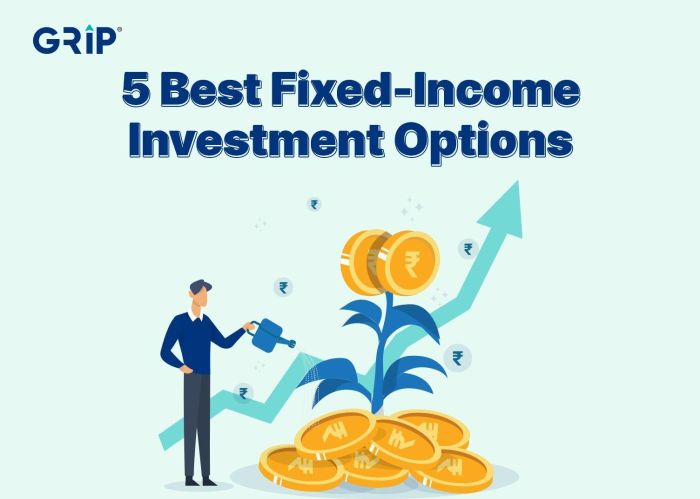Yo, let’s talk about fixed-income investments! This is where you can make some cash without all the crazy risks of the stock market. So, buckle up and get ready to learn about all the different ways you can invest your money in a chill and stable manner.
Now, let’s break down the nitty-gritty details of the various types of fixed-income investments and how they can benefit you in the long run.
Types of Fixed-Income Investments
When it comes to fixed-income investments, there are several options available in the market that investors can consider. These investments are known for providing a steady stream of income over a specified period, making them a popular choice among those looking for stable returns.
Bonds, Certificates of Deposit, and Treasury Securities
- Bonds: These are debt securities issued by governments, municipalities, or corporations to raise capital. Investors who purchase bonds are essentially lending money to the issuer in exchange for periodic interest payments and the return of the principal amount at maturity.
- Certificates of Deposit (CDs): CDs are time deposits offered by banks and credit unions. Investors deposit a specific amount of money for a predetermined period, during which they earn a fixed interest rate. CDs are considered low-risk investments due to their FDIC insurance coverage.
- Treasury Securities: These are debt instruments issued by the U.S. Department of the Treasury to finance government operations and pay off existing debt. Treasury securities include Treasury bills, notes, and bonds, each with different maturities and interest payment schedules.
Corporate Bonds vs. Municipal Bonds
- Corporate Bonds: These are bonds issued by corporations to raise funds for various purposes, such as expansion, acquisitions, or debt refinancing. Corporate bonds typically offer higher yields than government bonds but come with a higher level of risk due to the issuer’s creditworthiness.
- Municipal Bonds: Municipal bonds are issued by state and local governments to finance public projects, such as infrastructure development or schools. They are exempt from federal taxes and may also be exempt from state and local taxes, making them attractive to investors in higher tax brackets.
Risks Associated with Fixed-Income Investments

Investing in fixed-income securities comes with its own set of risks that investors need to be aware of. These risks can impact the returns and overall performance of the investment. Two key risks associated with fixed-income investments are interest rate risk and credit risk.
Interest Rate Risk
Interest rate risk is the risk that the value of a fixed-income investment will decrease due to changes in interest rates. When interest rates rise, the value of existing fixed-income securities tends to fall, as newer securities offer higher yields. Conversely, when interest rates fall, the value of existing fixed-income securities tends to rise. This can result in capital losses for investors who need to sell their securities before maturity.
Credit Risk
Credit risk is the risk that the issuer of a fixed-income security will default on its payments. This risk is more pronounced for lower-rated bonds, as they are issued by companies or governments with a higher likelihood of default. Investors in fixed-income securities with higher credit risk are compensated with higher yields, but there is always the possibility of facing loss of principal if the issuer fails to make payments.
Benefits of Fixed-Income Investments
Investing in fixed-income securities can offer several advantages to investors looking to diversify their portfolios and mitigate risk.
Steady Income Stream
One of the key benefits of fixed-income investments is the predictable and reliable income stream they provide. Whether it’s through regular coupon payments from bonds or dividends from preferred stocks, investors can count on a steady flow of income to supplement their overall investment returns.
Hedge Against Stock Market Volatility
Fixed-income investments can also serve as a hedge against the volatility of the stock market. When the stock market experiences downturns or fluctuations, fixed-income securities often remain stable or even increase in value. This can help investors protect their capital and reduce overall portfolio risk.
Factors to Consider When Investing in Fixed-Income Securities
When diving into the world of fixed-income securities, there are several key factors to keep in mind before making any investment decisions. These factors play a crucial role in determining the potential returns and risks associated with these investments.
Role of Maturity, Credit Quality, and Yield
- Maturity: The maturity date of a fixed-income security indicates when the principal amount will be repaid to the investor. Shorter maturity securities usually have lower risk but offer lower returns, while longer maturity securities may provide higher returns but come with higher risk.
- Credit Quality: The credit rating of a fixed-income security reflects the issuer’s ability to repay the principal and interest on time. Higher credit quality securities are considered safer investments but offer lower yields, while lower credit quality securities come with higher risk but potentially higher returns.
- Yield: The yield of a fixed-income security is the return an investor receives on their investment, usually expressed as a percentage. It’s important to consider the yield in relation to the risk involved and compare it with other investment opportunities to assess its attractiveness.
Impact of Market Conditions and Economic Indicators
- Market Conditions: Fluctuations in interest rates, inflation rates, and overall market conditions can impact the value of fixed-income securities. Investors need to stay informed about these changes to adjust their investment strategies accordingly.
- Economic Indicators: Indicators like GDP growth, unemployment rates, and consumer spending can affect the performance of fixed-income investments. Understanding how these indicators influence the economy can help investors make informed decisions about their fixed-income portfolios.
